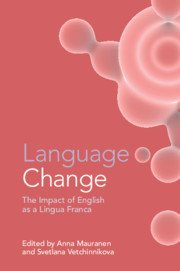Book contents
- Language Change
- Language Change
- Copyright page
- Contents
- Figures
- Tables
- Contributors
- Acknowledgements
- Abbreviations
- Introduction
- Part I Pooling Perspectives
- 1 Calling Englishes As Complex Dynamic Systems: Diffusion and Restructuring
- 2 English as a Lingua Franca in the Context of a Sociolinguistic Typology of Contact Languages
- 3 How Writing Changes Language
- 4 ELF and Translation As Language Contact
- 5 Present-Day Standard English
- 6 Beyond Language Change
- Part II Zooming in on ELF
- Index
- References
5 - Present-Day Standard English
Whose Language Was It Anyway?
from Part I - Pooling Perspectives
Published online by Cambridge University Press: 17 December 2020
- Language Change
- Language Change
- Copyright page
- Contents
- Figures
- Tables
- Contributors
- Acknowledgements
- Abbreviations
- Introduction
- Part I Pooling Perspectives
- 1 Calling Englishes As Complex Dynamic Systems: Diffusion and Restructuring
- 2 English as a Lingua Franca in the Context of a Sociolinguistic Typology of Contact Languages
- 3 How Writing Changes Language
- 4 ELF and Translation As Language Contact
- 5 Present-Day Standard English
- 6 Beyond Language Change
- Part II Zooming in on ELF
- Index
- References
Summary
The Standard English third-person singular -s of present-tense verbs may not be of much consequence in international communication today, but its history reveals interesting parallels with processes that are typical of ELF. Drawing on research on historical corpora and databases, this chapter draws attention to the fact that Standard English is an accumulation of features that were adopted by speakers of English in different periods and from a variety of origins – just as in English used in international communication today, but by a smaller speaker population and from a more limited feature pool. The case study traces the spread of verbal -s back to Late Middle and Early Modern English, and reconstructs the processes that it underwent regionally and socially, and from speech to writing. The alternative expressions that could have been selected instead include the suffixless variant, commonly found in ELF today.
Keywords
- Type
- Chapter
- Information
- Language ChangeThe Impact of English as a Lingua Franca, pp. 123 - 151Publisher: Cambridge University PressPrint publication year: 2020

